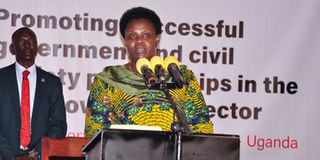Prime
Museveni issues fresh orders on land evictions

Vice President Jessica Alupo addresses delegates at the launch of the Learning Week on Wednesday. Photo | Busein Samilu
What you need to know:
- The President says having 70 percent of the land undocumented is one of the reasons land grabbers thrive.
President Museveni has directed the Ministry of Lands to use all measures to ensure illegal land evictions are eliminated in the country.
In a speech read for him by Vice President Jessica Alupo to delegates at the launch of Learning Week in Kampala on Wednesday, Mr Museveni said the government should ensure that Ugandans, especially at the grassroots, are protected from evictions.
“Government should be mindful and protect citizens from land evictions, which adversely affect the majority and most vulnerable categories of owners and users,” he said.
The President said having 70 percent of the land undocumented is one of the reasons land grabbers thrive at the expense of vulnerable Ugandans.
“It is now important for land governance matters to guide all the stakeholders in ensuring there is certainty of land ownership, which enables citizens to correctly and openly identify and recognise land owners and any other user rights that exist on the land at any one time. This, in turn, should lead to greater social cohesion,” he said.
This directive comes days after Mr Museveni directed landlords to stop illegal evictions of bibanja holders. During the 35th Heroes’ Day celebrations in Gomba District on Sunday, Mr Museveni said any landlord who charges excessive nominal rent fees (obusuulu) should immediately return the fees to bibanja holders or risk being arrested.
“The landlords who have been charging more than the agreed busuulu fees by the district must return it, and if they try to evict our people, we shall arrest them. You must pay back all the money you have taken from these people because the evictions are illegal,” he said.
The directives provide great relief to communities in the villages of Ngondwe-Kanziro, Gayaza and Busamba in Namayumba Sub-county in Kakiri Town Council, where more than 5,000 residents face evictions after one Berna Nakato, tried to force some of them out after acquiring 200 acres on the 1,044 acre land of the late Gabdyeri Lubajja.
Mr Kiryowa Kiwanuka, the Attorney General, in a November 7, 2023 letter to Lands Minister Judith Nabakooba, which was made public this week, using current legal frameworks, reaffirmed that tenants are free to enjoy their stay on land uninterrupted provided they pay their nominal Busuulu.
“Tenants by occupancy have the option to deposit money in court when the landlord is known but cannot be located. To reduce the influx of cases in the court, land tribunals can be established to handle land-related disputes related to the payment of nominal ground rent,” Mr Kiwanuka said.
“The Land Fund can be used to acquire the interests of absentee landlords, which can then be transferred to tenants by occupancy, subject to specific terms and conditions,” he added.
Mr Kiryowa also informed Ms Nabakooba that the existing legal and policy framework allows her as the minister responsible for Lands, to draft a statutory instrument for payment of nominal ground rent [providing also for payment in case of an absentee landlord] and the relationship between lawful and bona fide occupants.
This guidance comes days after Mr Kiryowa okayed bibanja holders and other people who have stayed on registered, unregistered and leasehold land with absentee landlords for 12 years to apply for certificates of titles.
The Learning Week, which attracted more than 100 delegates from 35 countries, was hosted by the Lands ministry under the theme, ‘Government and civil society partnerships in land governance in global land in 2024’.
The week, which kicked off on June 9, will end on June 15. It is aimed at showcasing how successful government-civil society partnerships in the land governance sector can facilitate people-centred land governance.
“Insecure land tenure is a fundamental barrier to every nation towards overcoming the most pressing challenges, including poverty, hunger, urbanisation, climate change, conflict, violence, and lack of economic opportunity to transform the lives,” Ms Nabakooba said.
Dr Mike Taylor, the director of International Land Coalition, said through interactions and sharing of knowledge, land rights and governance will be on fingertips of all delegates and will in turn disseminate it to their respective countries.
Ms Frances Birungi Odong, the executive director of Uganda Community-Based Associations for Women and Child Welfare, called for strengthening of the policies and implementing them to protect the vulnerable communities.




